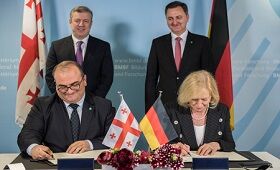GOVET supports Georgian education and training reform
22.07.2016
Georgia is reforming its education and training system in order to improve the quality of products and services. Federal Education Minister Wanka assures her Georgian counterpart Jejelava of German support.
The Georgian departments for education, employment and health, together with employer associations, are all involved in the implementation of the reforms which began in 2013. As part of the programme “Strategy for vocational education and training development for 2013 -2020”, the goal is to train skilled workers to international standards. This training should be practical and focussed on business needs. When making this systemic change, Georgia is seeking to learn from the German experience with the dual vocational education and training system. On 15 June, a Georgian delegation visited Berlin in order to determine the focus of collaboration with the Federal Ministry of Education and Research (BMBF). In a joint letter of intent, Prof. Dr. Johanna Wanka, the Federal Education Minister, assured her Georgian counterpart, Dr. Aleksandre Jejelava of German support.
In a discussion which followed with vocational training stakeholders from both countries, it was explained that projects which already existed should be combined at a local level to function holistically and in a complementary manner. This would mainly concern the sectors of logistics, food processing, construction and tourism. The collaboration should involve close coordination with Swiss colleagues who cooperate, in particular in the area of agriculture, with Georgia.
The Federal Ministry of Economic Cooperation and Development (BMZ) outlined the German involvement as part of the Caucasus initiative. The focus of support from the regional vocational education and training programme is commercial development, in particular for small and medium-sized enterprises. Projects in tourism and viticulture were presented as an example. The involvement of integrated skilled workers (CIM), cooperation with an employer association and the training of international VET experts at the University of Magdeburg were also addressed.
In another contribution, BIBB Research Director Professor Reinhold Weiß stressed the relevance of research accompanying a specialist initiative. The intention is for vocational education and training research to provide effective support for the activities in the Caucasus republic over the longer term.
Over 350 German businesses operate in Georgia. The Eastern Europe Business Association of Germany therefore explicitly welcomed the cooperation during the event.
The Georgian reform has so far included, amongst other things, the restructuring of 270 occupational profiles with the involvement of more than 600 companies. In order to make vocational education and training more attractive to young people, vocational school equipment has been improved, the learning environment as a whole has been updated and the practical element has been consolidated. The long-term aim is for the practical element to comprise 80% of the training. Access to vocational education and training for people with disabilities has also been improved. A rise in the number of trainees since the reforms started shows the efforts made are appreciated by young people in Georgia.
GOVET provides specialist support for the cooperation with Georgia. In the third quarter of 2016, a group of Georgian colleagues will complete a six week period of work shadowing in the BIBB within the GIZ management programme looking at curriculum development, vocational education and training staff and inter-company internal and continuing education and training centres. The insights gained are to be further developed in a specialist workshop in Georgia.
